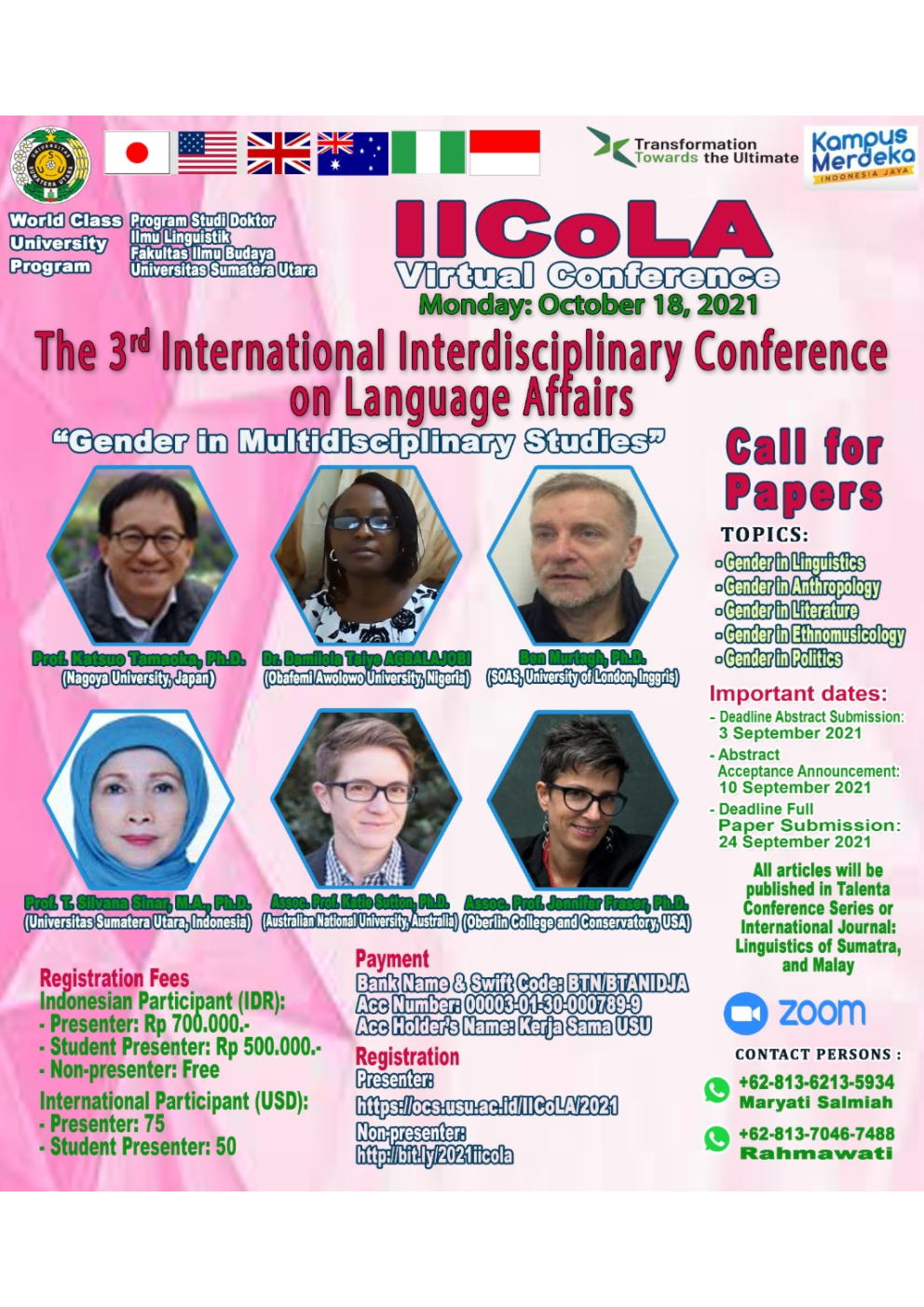Sumatera Utara
October 18, 2021 – October 19, 2021
The word gender describes the socially constructed roles and responsibilities that societies consider appropriate for men and women. Gender is referred to variously across areas of social science. In a specific social setting, the culture legalizes values, expectations, meanings, and patterns of behavior and communication of its society. The word "gender" came into everyday use as an alternative to the word "sex" in the United States in the 1970s (Krieger, 2003). Using the word "gender" was a way for researchers and activists to counter the belief that our masculinity and femininity were biologically determined – a belief pervading the scientific and lay communities at the time (Krieger, 2003). Women's empowerment is a critical aspect of achieving gender equality. It includes increasing a woman's sense of self-worth, decision-making power, access to opportunities and resources, power and control over her own life inside and outside the home, and ability to effect change. Women are assumed in homemaking, care giving and subservient roles.
Conversely, men are represented as leaders and breadwinners. Furthermore, in many cultures, women take the name of their husbands after getting married, sons have more freedom to play outside the house, and daughters have to be more at home and take care of younger siblings. Additionally, it shows that at specific schools or academies, the gendered based positioned are offered for student recruitment so that they will be able to fulfill the requirement of future work positions. Due to daily practices, such gender issues are considered normal or not realized as forms of gender identities (Ghaur, 2006).
Gender equality means that men and women have equal power and equal opportunities for financial independence, education, and personal development. Gender equality is a social condition whereby women and men share equal rights and a balance of power, status, opportunities, and rewards. Gender equality can be broadly operationalized by men and women having 1) equitable access and use of resources, 2) equitable participation in relationships, the household, the community, and political arenas, and 3) safety or freedom from violence (Rolleri, 2012). Concerning gender, some factors affect the gendered use of linguistic varieties. The first is employment opportunity. When people try to work, they are usually obligated to express specific types of language skills. Men and women can choose different kinds of jobs because they can be gender-specific or only men or women interested in specific jobs based on local or temporary considerations. Although sometimes the work situation does not obligate them to speak using specific linguistic skills, being in a particular workplace makes people form their varieties. So, men or women can use different language varieties when exposed to different kinds of workplaces.
Gender issues are explored in various disciplines such as Linguistics, anthropology, history, and education to investigate the problem and find a solution in gender cases. Anthropology studies gender both as a practice and as a politically viable frame to examine the representation of people's agency and access to power in everyday life (Shahrokhi, 2017). Linguistics has a role important in a study about language use and its essential in human life. Additionally, linguistic varieties might also be affected by women's and men's social networks. Based on Lesley Milroy's study shows that social networks supported the use of local language. The number and kinds of connections of a network are affected by class. In working-class communities where people live close to each other to spend time together with their relatives and neighbors, the connection and communication are easier to be built.
Meanwhile, in the poor situation for women, women did not have many networks. As a result, compared to their male peers who had more networks, they used less vernacular language than their male peers. In another place, however, Milroy found that the women who were involved in more extensive in more networks and employment used more vernacular language (Eckert and Ginet, 2003).
Accordingly, the Linguistics Doctorate Program at Universitas Sumatera Utara Faculty of Cultural Study wishes to contribute to the discussion and development of gender study by organizing an International Conference called “The 3rd International Interdisciplinary Conference on Language Affairs (IICoLA)". This conference will invite experts from several countries and different backgrounds to contribute to gender study.

Primary Speakers
- Ben Murtagh, Ph.D. (SOAS, University of London Inggris)
- Assoc. Prof. Jennifer Fraser, Ph.D. (Oberlin College and Conservatory, Ohio USA)
- Prof. Katsuo Tamaoka, Ph.D. (Nagoya University, Japan)
- Assoc. Prof. Katie Sutton. Ph.D. (Australian University, Australia)
- Dr. Damilola Taiye AGBALAJOBI. (Obafemi Awolowo University, Nigeria)
- Prof. Dra. T. Silvana Sinar, M.A., Ph.D. (Universitas Sumatera Utara Indonesia)
Honorary Board
- Dr. Muryanto Amin, M.Si. (Rector, University of Sumatera Utara)
- Dr. Poppy Anjelisa Zaitun Hasibuan, M.Si., Apt. (University of Sumatera Utara)
- Dr. T. Thyrhaya Zein, M.A. (Dean of Faculty of Cultural Sciences, University of Sumatera Utara)
International Board
- Ben Murtagh, Ph.D. (SOAS, University of London Inggris)
- Assoc. Prof. Jennifer Fraser, Ph.D. (Oberlin College and Conservatory, Ohio USA)
- Prof. Katsuo Tamaoka, Ph.D. (Nagoya University, Japan)
- Assoc. Prof. Katie Sutton. Ph.D. (Australian University, Australia)
- Dr. Damilola Taiye AGBALAJOBI (Obafemi Awolowo University, Nigeria)
- Prof. Dra. T. Silvana Sinar, M.A., Ph.D. (Universitas Sumatera Utara Indonesia)
Editorial Board
- Prof. Dr. Robert Sibarani, M.S. (University of Sumatera Utara)
- Prof. Dr. Ketut Artawa M.A. (Udayana University)
- Prof. Amrin Saragih, M.A., Ph.D. (Medan State University)
- Prof. Dr. Oktavianus, M.Hum. (Andalas University)
- Prof. Dr. Jufrizal, M.Hum. (Padang State University)
- Prof. Dr. I Dewa Putu Wijana, S.U, M.A. (Gadjah Mada University)
- Dr. Eddy Setia, M.Ed.TESP. (University of Sumatera Utara)
Committee
| Guarantor | : | Dr. T. Thyrhaya Zein, M.A (Dean) |
| Vice guarantor | : | Dra. Heristina Dewi, M.Pd. (Vice Dean 2) |
| : | Dr. Eddy Setia, M.Ed.TESP (Head of Program Study) | |
| Chairman | : | Dr. Mulyadi, M.Hum. |
| Secretary | : | Dr. Tasnim Lubis, M.Hum. |
